

Fintech is playing the long game. Our team has been actively investing in fintech for the past two years.
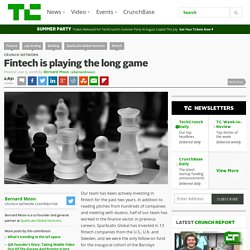
In addition to reading pitches from hundreds of companies and meeting with dozens, half of our team has worked in the finance sector in previous careers. SparkLabs Global has invested in 13 fintech companies from the U.S., U.K. and Sweden, and we were the only follow-on fund for the inaugural cohort of the Barclays Accelerator program. With this accumulated knowledge, we decided to create an easy to read overview for others to get up to speed on how innovation and technology will disrupt the financial sector. Here is our full report; the following is a summary of what we’ve learned so far. There has been a flurry of activity over the past several years. Lsa-conso. "Personne ne peut forcer un mode de paiement et on ne sait pas qui va gagner.

Il faut faciliter les expériences et ne pas oublier que les nouvelles technologies doivent apporter de la praticité, sans oublier la sécurité et des solutions ouvertes qui fonctionnent sur toutes les plates-formes. " Voici la philosophie de Bart Willaert, directeur général de MasterCard en France. En somme, pas question de privilégier une technologie plutôt qu’une autre, c’est le consommateur qui décide in fine! Et selon Christophe Zehnacker, responsable des paiements digitaux pour l’Europe de l’Ouest, "entre la pré-commande de boissons, le paiement dans des applications, le paiement NFC, ou encore la reconnaissance faciale...
Les projets autour du paiement ne manque pas. " Trois vagues de transition vers le digital Selon MasterCard la transformation du paiement vers le numérique a commencé dès les années 1990. La deuxième transformation en cours provient de l’avènement des smartphones. Et la biometrie? La terrible menace qui plane sur les #banques. Corporate hacking and the financial services industry. Bank Board Director Alert: Banking on Cybersecurity. Prudential bank regulators and other supervisory authorities have put cybersecurity front and center in 2015 by issuing guidance that sets forth their expectations of improved cybersecurity and that incorporates cybersecurity assessments into the scope of examinations.
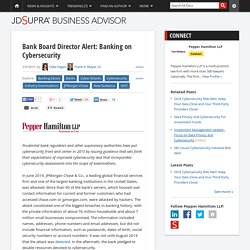
In June 2014, JPMorgan Chase & Co., a leading global financial services firm and one of the largest banking institutions in the United States, was attacked. More than 90 of the bank’s servers, which housed user contact information for current and former customers who had accessed chase.com or jpmorgan.com, were attacked by hackers. The attack constituted one of the biggest breaches in banking history, with the private information of about 76 million households and about 7 million small businesses compromised. The information included names, addresses, phone numbers and email addresses, but did not include financial information, such as passwords, dates of birth, social security numbers or account numbers.
Bitcoin and the Digital-Currency Revolution. About a half-billion dollars worth of it vanished from an online exchange in Tokyo.
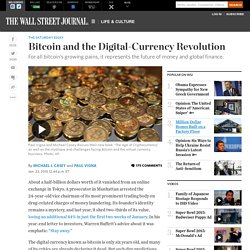
A prosecutor in Manhattan arrested the 24-year-old vice chairman of its most prominent trading body on drug-related charges of money laundering. Its founder’s identity remains a mystery, and last year, it shed two-thirds of its value, losing an additional 44% in just the first two weeks of January. In his year-end letter to investors, Warren Buffett’s advice about it was emphatic: “Stay away.” The digital currency known as bitcoin is only six years old, and many of its critics are already declaring it dead. But such dire predictions miss a far more important point: Whether bitcoin survives or not, the technology underlying it is here to stay.
No digital currency will soon dislodge the dollar, but bitcoin is much more than a currency. The Financial Brand - Dark Wallet, les anarchistes de l'argent. Banlieue est de Paris, tout près du périphérique.
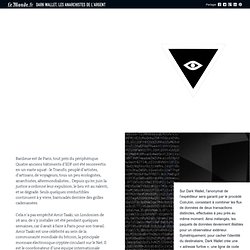
Lenders Disrupt U.K. Finance Funding Startups Banks Avoid. The overthrow of British banking is being plotted in between pingpong games in a 10-story office building near London’s Fleet Street.
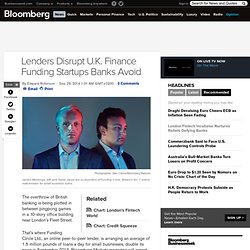
That’s where Funding Circle Ltd., an online peer-to-peer lender, is arranging an average of 1.5 million pounds of loans a day for small businesses, double its pace in September 2013, Bloomberg Markets magazine will report in its November issue. More from the November issue of Bloomberg Markets: London Fintech Incubator Nurtures Rebels Defying Banks On a hot summer afternoon, the startup’s open-plan suite is filled with the chatter of two dozen account reps on the phone with borrowers.
Two young software developers are taking a break to play table tennis. Mobile payments: How digital finance is transforming agriculture. It’s becoming increasingly clear that cash payment schemes are obsolete in the 21st century.
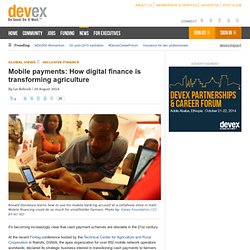
At the recent Fin4ag conference hosted by the Technical Center for Agriculture and Rural Cooperation in Nairobi, GSMA, the apex organization for over 850 mobile network operators worldwide, declared its strategic business interest in transitioning cash payments to farmers by large commodity buyers to mobile payments.
La géolocalisation au service de la sécurité bancaire. For Banks, Better Data Management Means More Effective Fraud and Crime Prevention. Disrupt the Banks. Why haven’t start-ups completely taken over the personal finance industry?
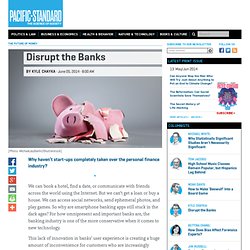
We can book a hotel, find a date, or communicate with friends across the world using the Internet. But we can’t get a loan or buy a house. We can access social networks, send ephemeral photos, and play games. So why are smartphone banking apps still stuck in the dark ages? For how omnipresent and important banks are, the banking industry is one of the more conservative when it comes to new technology. Les banques face à la révolution numérique. Après le thème de l’emploi, je vais continuer cette petite série de l’été sur les faux semblants du numérique.

Nous allons passer en revue quelques industries ou métiers dont la disparition est parfois annoncée quelque peu prématurément. Exemples retenus : les banques, la télévision et les usines. A chaque fois, ces industries ont ou font face aux révolutions numériques et font face à de nouvelles formes de concurrence. Les banques françaises multiplient les initiatives dans la téléphonie mobile.